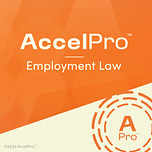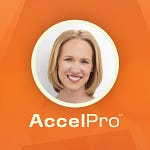Welcome to AccelPro Employment Law, where we provide expert interviews and coaching to accelerate your professional development. Today we’re featuring a conversation about cancer, COVID-19 and the workplace. Our guest is Ann Hodges, a professor emerita at the University of Richmond and 30-year cancer survivor.
She co-founded an organization called CancerLINC, which has helped countless people with cancer navigate myriad issues, including those related to employment law.
In this interview, she explains the complicated legal landscape that employers and cancer patients face in the working world, how COVID-19 is shaping the future of work for people with cancer (and other illnesses) and the conflicts of interest that administrators of disability plans deal with when deciding whether to approve benefits. The supplemental materials and episode transcript are available below.
AccelPro’s expert interviews and coaching accelerate your professional development. Join AccelPro Employment Law now for a free trial of everything we offer to members.
Interview References:
Ann Hodges’ University of Richmond faculty profile.
7:52 | Hodges, Ann. (2018). Modernizing Disability Income for Cancer Survivors. Hofstra Labor & Employment Law Journal, 35(2).
8:23 | Cancer in the Workplace and the ADA. ADA, Rehabilitation Act, 29 CFR Part 1630.
10:11 | Family and Medical Leave (FAML). The Family and Medical Leave Act, 29 CFR Part 825.
14:00 | Comparison of Federal vs. State vs. Private Disability Benefits. Patient Advocate Foundation.
8:30 | (2022). Department Of Labor Announces Streamlined Claims Process For Federal Firefighters With Certain Occupational Illnesses. U.S. Department of Labor.
Supplemental Materials:
Watch this news report with Hodges to hear more about the impact of CancerLINC.
Follow CancerLINC on Facebook and Instagram.
TRANSCRIPT
I. RETURNING CONTROL TO THOSE WHO HAVE LOST IT
Matt Crossman, Host: What is CancerLINC and why did you start it?
Ann Hodges: So CancerLINC is an organization that helps cancer patients and their families with the issues that arise out of cancer that are not medical issues. Typically those are financial issues and/or legal issues. Those issues are not what we first think about when we think about cancer.
Of course, we first think about the medical issues. But these legal and financial issues can be very stressful and difficult for individuals who are dealing with cancer. So the goal of CancerLINC is to lift that burden of those legal and financial issues from the patients and their families so that they can focus on the healing, the medical issues, getting well, and spending time with each other.
MC: You were already an employment law expert before this, and this gave you an entirely new education on the subject. You’re a survivor yourself, which I would like for you to speak to as you answer this question. What did you learn about employment law by being in the trenches, both yourself and helping others, that would be valuable for HR people and employment law attorneys to know?
AH: I had a bout with breast cancer back in 1992. I’m a 30-year survivor of cancer. What we often feel when we have cancer is a loss of control, and I’m a person that likes to be in control, as most of us do. And cancer comes into your life, and you lose that control over a lot of things.
I did not have some of the difficulties that I have seen other cancer patients deal with when I had my own bout with cancer. My employer was terrific. My journey was relatively easy, as these things go.
As I was recovering, a friend introduced me to another employment lawyer, Phyllis Katz, who was also a cancer survivor. She has become a dear friend. She had struggles with her own bout with breast cancer that I hadn’t faced and had come to the realization that lawyers could provide significant help to those dealing with cancer with some of these issues. She had this idea of starting an organization that would bring together lawyers who are supposed to provide pro bono services—that’s part of our obligation as lawyers.
She wanted to connect the lawyers providing pro bono services with cancer patients and their families that needed those services at a crucial time in their lives. And when she told me this idea, I just lit up. This is a way to take a negative experience and turn it into something positive and to get back some control.
And so the two of us, along with lots of other folks who helped along the way, started this organization. We started with a conference that brought together legal people, medical people, social workers, individuals who worked with cancer patients in all kinds of ways, and learned about these issues and talked about the various issues. We educated folks, and one of the things that we asked of the lawyers who came to this conference was to commit to doing pro bono service for individuals with cancer.
And ultimately out of this we created what was initially called Link. We now call it CancerLINC, and it’s been going now for 26 years, connecting cancer patients in the Central Virginia area with lawyers. We later expanded to financial planners to help folks with financial issues. We connect those together and really make a difference for cancer patients and their families.
MC: This sounds like a perfect example of merging a personal passion with professional development. You mentioned the pro bono work. We’re all searching for meaning in our professional lives. We all want to do good for people. For attorneys and others in the employment law space who have a passion for a topic like you do on this, what advice do you have for integrating a personal passion into your professional life?
AH: I think it’s so important to love what you do and to share that with other folks. I taught in the law school at the University of Richmond for 30 years. One of the wonderful things I’ve seen is that so many of my students and former students volunteer for CancerLINC. I go to events and I see all of these students, some of whom started doing this in law school, and they’re still doing it. Some of them have even moved to work in the field, which is just incredibly rewarding.
Sometimes it’s something that you’re not doing in your day-to-day life. We have lawyers who might be doing commercial litigation in their practice, but they learn how to help someone get Social Security disability, and they can do that on a pro bono basis. And I think that the lawyers and the financial planners who do this find it incredibly rewarding to just make a difference in somebody’s life.
The cancer patients and their families are deeply grateful for the support because it lifts a burden. It’s one of those things that weighs on you at a time when you don’t need anything weighing on you. Oh no, I’m about to lose my job, or I need to get disability benefits or, I never did a will and now I need one.
There’s so many things like that—my insurance won’t pay for the treatment that I need. I need to appeal. Even folks who are capable of doing those tasks when they feel well, when they’re sick and undergoing cancer treatment and surgery and chemotherapy, they don’t feel up to doing it.
That's one of the things that I heard from Phyllis Katz when she talked about starting this organization. She was a lawyer, and one of the things she thought was, “I’m calling up, and I’m trying to deal with these hospital bills. I’m a lawyer and I’m perfectly capable of doing this when I feel OK, but I don’t even have the energy to be on hold on the telephone to wait for somebody to talk to me because I’m sick.” So there are lots of ways that burden can be lifted.
—
II. THE CHALLENGES OF SICK LEAVE
MC: In an article a few years ago, you wrote that the law has not kept up with medical developments to the detriment of cancer survivors. Speaking of employment law specifically, how so? And has the law caught up at all?
Listen to this episode with a 7-day free trial
Subscribe to AccelPro | Employment & Labor Law to listen to this post and get 7 days of free access to the full post archives.












